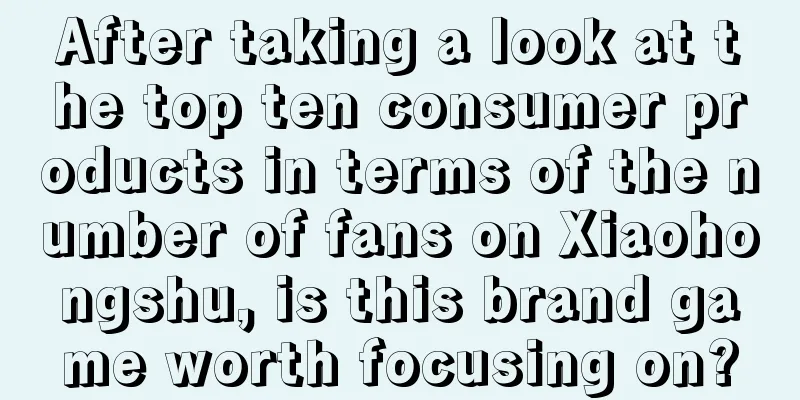Competing for low prices, stealing traffic, and criticizing other companies, the business war in 2023 is "crazy"

When many people mention business wars, their first reaction is the plots in movies and TV dramas: company executives fight openly and secretly, spy on each other, and in the end the protagonist shorts the opponent and wins the prize. If you are used to seeing the business wars in reality, you will understand that art is art after all, originating from life but transcending life. Because the business wars in reality often start in the simplest way: stealing the traffic of the opponent's live broadcast room, blocking the opponent's IP, shouting at each other from a distance... Business wars happen every year, but this year's plot is particularly rich. Hema and Sam's Club are competing fiercely over the price of a durian cake; the three e-commerce giants are competing fiercely to offer low prices; Tencent and NetEase are once again "confronting" head-on in the gaming field over "Dream Star"; Xiaomi and Huawei are "fighting" each other over patented technology. Companies have various tricks, but consumers are most interested in talking about the "plain and simple" parts, such as discussing how Dong Yuhui's "mother-in-law" sent traffic to the rival live broadcast room, and how the IP address of Hema headquarters was blocked by Sam's Club APP. However, for onlookers, the more exciting the business wars are, the better. After all, there is something exciting to watch and they can spend less money and buy better products. Behind the commercial wars launched by various companies is an increasingly competitive market environment. Especially for brands in the same track, facing the same type of consumers, the competitive environment will be more complicated. In the midst of competition, commercial wars are a marketing method and a self-protection mechanism. Looking back at the business world in 2023, we can describe it as wonderful. As the saying goes, business is like a battlefield, and no one can take it lightly when they are in it. 1. The business war in 2023 will be full of varietyIn 2023, companies' business warfare postures will become more and more diverse. On the morning of December 14, the topic of "Hema headquarters IP address blocked by Sam's App" attracted much attention. The reason was that someone claiming to be an Alibaba employee posted that he could not use Sam's App at Hema headquarters, questioned that the IP address of Hema headquarters was blocked by Sam's Club, and joked, "Is this a business war?" After Sina Technology verified with Hema employees, an insider replied that the specific situation was not clear. Neither party has denied the incident, nor has they made an official response to the incident, but their competitive relationship in the new retail sector is already well known. The business war between Hema and Sam's Club took a sudden turn. From referring to Sam's model to directly targeting Sam's Club, the competition between the two companies became direct and fierce. As a typical player in the domestic new retail industry, Hema is looking for a more suitable path for its own development while referring to the model of Sam's Club. For example, based on the habits of Chinese consumers, Hema has improved Sam's Club's 1.2kg Swiss roll into smaller portions. In terms of procurement model, Hema has also abandoned the KA model of traditional stores and mainly purchases on its own platform, gradually growing stronger. It was only this year that Hema officially declared war on Sam's Club with its rapid layout. It copied Sam's Club's popular products at a lower price. Hou Yi said that this would be a long-lasting price war. At the same time, Hema Fresh must transform into a discount store model while maintaining the label of "quality", which directly targets Sam's Club's cost-effectiveness. The fierce attack from the younger generation has made the older generation restless. In February this year, Zhu Xiaojing, president and CEO of Walmart China, said at an internal meeting that Hema is the only competitor of Walmart's Sam's Club in China. In other words, Sam's Club dare not underestimate any move by Hema. Old rivals Tencent and NetEase have recently entered a new stage of competition. Recently, Tencent's party game product "Dream Star" was officially launched, directly targeting NetEase's game "Egg Party" launched last year. The two game giants met again in the same field. "Yuan Meng Star", picture source: Yuan Meng Star Weibo This is undoubtedly a tough battle. Tencent has allocated 1.4 billion yuan in the first phase to build the game ecosystem; NetEase has launched the "Egg Building Festival" and said it will spend 500 million yuan in real money to encourage UGC creation. In addition to marketing investment, the two sides are also competing secretly. "Meta Dream Star" has a character called "Yi Banban" (average), and "Danzai Party" has released a new skin "E Xinxin" (disgusting). NetEase also launched a drink called "Penguin American Bar" at the company's front desk. The coffee description states, "Drink iced Americano, eat the penguin in one bite, and protect the best Danzai in the world." This somewhat childish approach has become a spice in the business war, harmless and even a topic of conversation. What may be more popular this year is the business warfare tactic of relying on the traffic of competitors. In the "Hua Xizi incident" in September this year, a number of veteran domestic brands took on the "overwhelming wealth", with Fenghua's performance being the most prominent. At that time, after the "Huaxizi incident" became a hot topic, consumers began to compare the weight and price of some of Huaxizi's products. After calculation, they found that as a domestic beauty brand, Huaxizi was not as cost-effective as international brands, and was even more expensive than gold in terms of weight. Huaxizi's image as an affordable domestic brand collapsed, and the old domestic brand Fenghua took advantage of the situation to catch up with the trend. At that time, Fenghua launched a 79-yuan cleaning and care package in the Douyin live broadcast room overnight, and played a joke that "one Huaxi coin can be exchanged for five and a half kilograms of Fenghua". After this wave of operations, the official account of Fenghua gained more than 500,000 followers. In front, Fenghua is stealing traffic, and in the back, Gaotu is "taking over" the traffic. Recently, the "small essay" incident of Oriental Selection has attracted much attention. First, the editor of Oriental Selection "backstabbed" Dong Yuhui in the comment section, and then the attitude of Sun Dongxu, the former CEO of Oriental Selection, in the live broadcast caused heated discussions, leading to speculation that Dong Yuhui was "suppressed" by Sun Dongxu. Soon, this incident triggered huge public opinion. Because they were dissatisfied with Dongfang Zhenxuan's treatment of Dong Yuhui, the anchor Dong Yuhui's fans turned to flock to the live broadcast room of the competitor Gaotu Jiapin. A large number of fans shouted in the comment section of Gaotu Jiapin to Gaotu Jiapin to "catch this overwhelming wealth." Dong Yuhui, photo from the official Douyin account of Oriental Selection On December 15, Gaotu CEO and founder Chen Xiangdong released the Gaotu Jiapin battle report showing that "the cumulative sales of live streaming on December 14th was more than 11.8 million" and "the number of fans exceeded 1 million", and this was during the period when Dong Yuhui was off the air. Sending traffic to competitors is something that no brand would like to see. Therefore, when competitors launch an attack, counterattacking quickly is the first choice for brands. Among all industries, the war of words in the mobile phone industry is the most intense and frequent. Whenever a new phone is released, mobile phone manufacturers will unconsciously shout at each other and compare themselves with their competitors. This time, the focus of the business war fell on Xiaomi and Huawei again. The dispute stems from a speech by Huawei Terminal BG CEO Yu Chengdong at the 2023 Huawei Pollen Annual Meeting: "They don't respect our (Huawei's) intellectual property rights very much. They just take it and make up a random name and call it their own. The double-rotation water drop hinge is directly turned into a keel hinge. The keel does not exist." Yu Chengdong's criticism was directed at Xiaomi's keel hinge, and Xiaomi was not to be outdone and responded in kind. Xiaomi Group issued a statement saying that recently, Mr. Yu Chengdong made unfounded and untrue remarks about the company's "keel hinge" technology, which was seriously inconsistent with the facts. At the end, Xiaomi said sharply, "Please Mr. Yu Chengdong follow the basic rules of 'science and rigor' and stop smearing your peers and misleading the public." These representative events are just the tip of the iceberg of this year's business war. As competition becomes increasingly fierce, the business wars of enterprises may be beyond your imagination. 2. Why are brands so "tit-for-tat" this year?Business wars have always been an indispensable part of the business world, and many interesting plots will arise during the battle. Back then, when Wanglaoji and Jiaduobao were competing for market share, their salesmen pinched each other's cans to affect sales appearance; when shared bicycles and shared power banks were competing, product managers scratched each other's seats and unplugged each other's power cords. In recent years, netizens have divided business wars by region: the business war in Guangdong is to scald the other party's money tree to death with boiling water; the business war in Shanghai is to break the other party's coffee machine; the business war in Beijing is to put the other party's official seal in your bag. It sounds outrageous, but it is really happening. From the past to the present, the methods of business wars have only increased, and the intensity has also risen. Especially in this year's business wars, the protagonists are no longer low-key, but are tit-for-tat. When the "Mountain Moving Price" was launched, Hema CEO Hou Yi forwarded an article titled "Long-awaited Business War: Sam's Club and Hema Start" on WeChat Moments, writing, "It's been a long time since we started a war. It's very important to fight a war and train our troops." This year, all major e-commerce platforms shouted the slogan of low prices. Tmall and Taobao announced that the core goal of this year's Double 11 is "the lowest price on the entire network"; JD shouted "really cheap"; Pinduoduo's main theme is "really low prices every day." Luckin Coffee and Coodi, two coffee brands from the same school, are fighting fiercely for the 9.9 yuan price war and marketing war. Why are everyone starting to confront each other and even become hostile? This has to start with the overall business environment. The companies mentioned above are all in a very competitive field. Meituan, JD.com, Douyin, and Dingdong are all closely planning their own markets in the market where Hema and Sam's Club are located. The mobile phone industry where Xiaomi and Huawei are located has been in a cold winter for a long time, and players have entered the stage of competing in high-end and foldable screens; In the gaming industry where Tencent and NetEase are located, social party games have become a battleground; In the coffee market where Luckin Coffee and Kudi are located, the price war is fierce, and the leading brands are accelerating the pace of opening stores; Competition in the e-commerce market among Alibaba, JD.com, and Pinduoduo has become fierce, and low prices are almost a must for growth... The competition is fierce and the elimination round is brutal. If companies want to stand out in their respective fields, they will naturally have to do their best. Take Hema as an example. In August this year, Hema CEO Hou Yi told 36Kr Future Consumption, "(Price war) should be fought continuously. Find a single product to fight every month. The traffic brought by a single product is huge, so it is worth it no matter how you calculate it." On October 13 this year, Hema announced to the outside world that it had fully launched a "discount transformation." Starting from offline stores, Hema has drastically reduced the prices of more than 5,000 products by 20%, including major categories such as dairy products, biscuits, instant food, water and beverages, cleaning products, and frozen meat, poultry, and aquatic products. In the market competition, if you don't make progress, you will fall behind. Especially in the context of the overall challenging market environment, the business war is even more intense. The mobile phone industry has always liked to shout out to competitors, but this year it has been particularly tit-for-tat. At OnePlus's press conference this year, Xiaomi, a competitor, appeared quite frequently; at Xiaomi's press conference, it was also common to compare the various parameters of OnePlus phones. The latest tit-for-tat came from Xiaomi Group President Lu Weibing’s Weibo. On December 11, Lu Weibing said that the “gap” and “glue” incidents were getting more and more serious, and many users had chosen to return the devices. Although he did not specify the product, everyone knew it was the recently released OnePlus 12. Image source: Lu Weibing and Li Jie's Weibo On December 12, OnePlus China President Li Jie responded to issues related to OnePlus 12 on Weibo, saying that "it is not a quality issue" and "we have asked customer service to open a green channel and will respond as soon as possible to exchanges or returns." At the same time, Li Jie said, "I suggest that friendly competitors compare products in an honest and fair manner, and not engage in malicious competition or tricks. Some brand executives frequently engage in malicious misleading of the public, which is a very rare and bad behavior." It can be said that the fighting power of various brands has increased sharply this year. As the competition is fierce, the smell of gunpowder in each track is particularly strong. 3. Did the business warfare tactics work?Business war is just a means. The goal of the participating companies is the same, which is to increase brand sales and influence. In terms of effectiveness, some business warfare tactics can boost sales, while others are more like gimmicks. Just like Pinduoduo rose from the sinking market and made rapid progress with its low-price strategy. On November 28, Pinduoduo announced its third-quarter financial report ending September 30, 2023. The financial report shows that Pinduoduo's revenue in the third quarter was 68.84 billion yuan, a year-on-year increase of 94%; non-GAAP net profit attributable to Pinduoduo's ordinary shareholders was 17.027 billion yuan, a year-on-year increase of 37%. In the stock market of e-commerce, Pinduoduo can still achieve such high growth, which is the direct reason for attracting investors to vote with their feet. And low prices are the trump card for Pinduoduo to win this business war. Not only that, looking at the entire consumer industry, low prices are attractive. Hema's low-price strategy has helped it sell more items. According to data disclosed by Hema, the sales of Thousand Layer Durian Cake in Shanghai increased 26 times. In the Shanghai baking industry, there is even a saying that "Hema has taken over 2/3 of the Chinese durian raw material market." Luckin Coffee's low prices allowed it to avoid Starbucks, grow into the top domestic coffee brand, and set off a craze for local coffee in China. After reaching the scale of 10,000 stores in early June this year, the number of stores has now exceeded 13,000, and it is expected to exceed 15,000 by the end of the year. Its financial report data shows that in Q3 2023, Luckin Coffee's revenue was 7.20 billion yuan, a year-on-year increase of 84.9%, and its operating profit was 962 million yuan, with an operating profit margin of 13.36%. In contrast, methods such as stealing traffic and blocking IP addresses may attract attention in the short term, but they are unlikely to have long-term effects. The most typical example is that after the "Huaxizi incident", many domestic brands that had been silent for a long time began to gather together for warmth. In addition to Fenghua, in the live broadcast room of Hongxing Erke, the anchor was eating Baixiang instant noodles and drinking Huiyuan juice, with the theme song of Mixue Ice City playing in the background music; he washed his hair with Fenghua and promoted his own sports shoes by rubbing his hair with the soles of shoes... ERKE and domestic brands held online team building activities. Image source: ERKE Weibo Such operations have left consumers confused, with netizens bluntly stating that this is the "ceiling of cross-border sales", and some people expressing their disgust with such an approach. But Hongxing Erke has to do this. For old domestic brands like Hongxing Erke, traffic is like a flash in the pan and is hard to come by. In July 2021, Erke received widespread attention online for donating 50 million yuan in supplies to the Zhengzhou flood. It was once "wildly consumed" by netizens, but it was difficult to sustain after the popularity. According to statistics, in October of the same year, Erke's official live broadcast room lost nearly 300,000 fans in one month. Now, after the "Huaxizi incident" has passed, the voice of old domestic brands represented by Hongxing Erke and Fenghua has fallen again. This has caused the market to think about what the real business war is. In the 1980s, Jack Trout, president of Trout Consulting and a world-leading marketing strategist, once said that business war is a contest between various perceptions. "In the era of fierce competition, there is an oversupply of products in all walks of life. Whether a company can seize the minds of consumers and win their first choice has become the key to determining the survival of a company." In essence, clever business tactics are a manifestation of corporate innovation, but the traffic brought by some means is temporary. The real core lies in whether the business war strategy is in line with the long-term development of the enterprise and whether it can be truly implemented as a weapon. More importantly, whether the product has core competitiveness. Only when the product is competitive will consumers continue to follow the brand. Author: Wang Huiying Source: WeChat official account: "Lianxian Insight (ID: lxinsight)" |
<<: Customized travel "borrows the channel" from Xiaohongshu
>>: Why do customers still not buy even though you lowered the price?
Recommend
Luxury goods do not need brand positioning
Based on positioning theory, this article analyzes...
How to interpret Chinese New Year with "dragon content"? Check out these 6 highly praised brand cases!
China is about to usher in a new year - the Year o...
Can Amazon only log in on one network? What happens if I log in on different networks?
In the digital age, Amazon, as an e-commerce giant...
I'll be frank: China's marketing has changed dramatically
The failure of traditional brand marketing has bec...
My copywriting lost to the folk master again
Have you ever paid attention to the copywriting ar...
What are the risks of opening a wish store? Share the factors that lead to the risks of a wish store
I believe everyone should know that the Wish platf...
How to make a budget for Xiaohongshu spotlighting? |Practical version of spotlighting
On Xiaohongshu, a marketing platform with great po...
How does Shopee refund the price difference to customers? What should I do if the customer asks for a refund of the price difference?
After some Shopee customers bought a certain produ...
What is Xiaohongshu Lingxi? What is its significance for business operations?
After Xiaohongshu launched Lingxi, what can it do ...
How to become a marketer who will not be replaced by DeepSeek?
AI can not only efficiently generate copywriting a...
AI live streaming chaos frequently occurs, and the platform takes action to rectify the chaos of "AI beauties" and selling courses
With the rapid development of AI technology, the l...
Is Shein no longer available in the country? How can I access the Shein official website?
Shein (formerly known as SheInside) is a well-know...
What causes low Amazon product ratings? How to avoid them?
On the Amazon platform, there are many products wh...
8,200 words of practical experience in operating Xiaohongshu, no marketing but only practical stuff!
As a rare traffic depression, Xiaohongshu still ha...
Can the new rural "top streamer" bring goods?
In the wave of rural revitalization, a group of ne...









